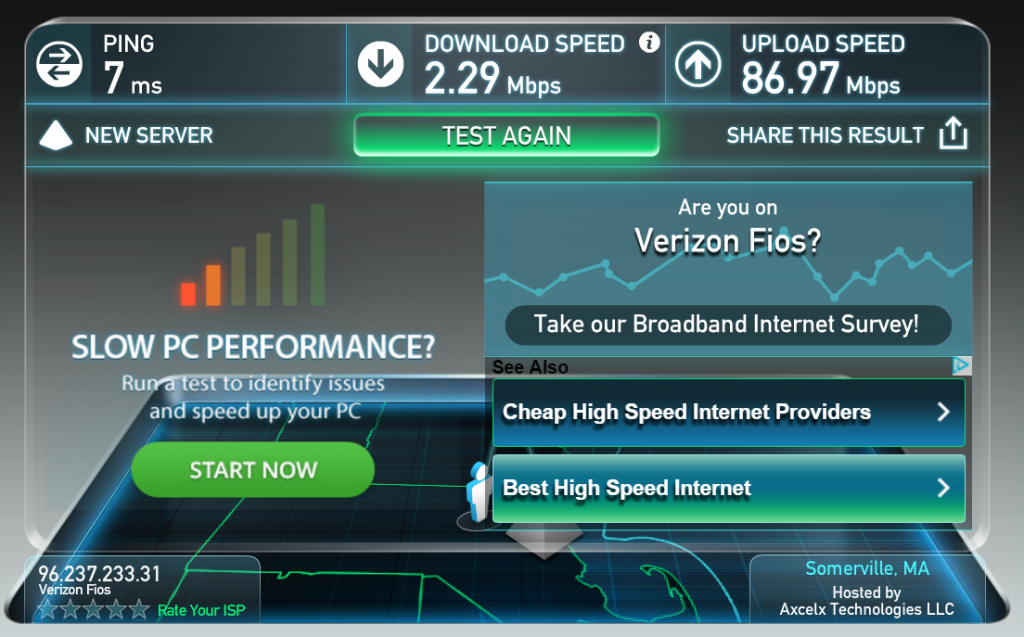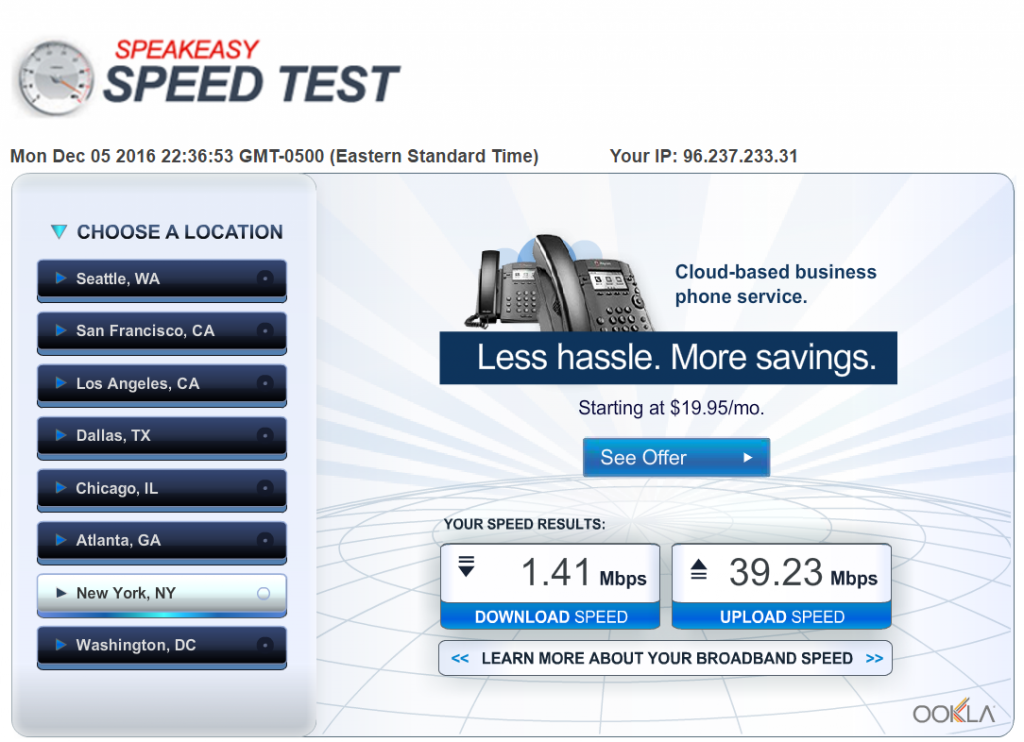Almost exactly a month ago my Verizon FiOS service slowed down to the point of being useless. After two hours on the phone with people who didn’t know anything about networking (saga), I was finally connected to someone who knew what tracert was, what DNS was, etc. The problem was diagnosed as being within Verizon’s network and was fixed the next day.
A month later and the symptoms are the same: high packet loss rates; failure to resolve host names (probably due to the packet loss); occasional bursts of connectivity.
After about 1.5 hours on the phone, however, Verizon decided that their incompetence and failure to monitor the network (previous post) was a good occasion for revenue enhancement. Without telling me “these guys are going to try to charge you a bunch of money,” the technically clueless person on the phone transferred me to “premium technical support.” It turns out that one aspect of premium technical support is a complete lack of records from the rest of Verizon. I asked the guy “Can you look up the records from November 6 and transfer me to the same group?” and the answer was that he had no records of any previous transactions on my account.
It seems that FiOS is going to be failing regularly and I’d rather not have to spend 2-3 hours on the phone each time with people asking me to reboot this device or that. So… is there a secret to bypassing their wall of ignorant first- and second-line agents?
[Separately, if Verizon is a phone company why can’t get they get their caller ID to work? I had to give my home telephone number, i.e., the one I was calling from, to about five different agents.]
[I managed to run a couple of speed tests during a brief window of connectivity…
]
Update: The Verizon tech showed up with a new Actiontec router, switched it from getting Internet via coax to getting it via CAT5, rebooted the ONT a few times, and now everything seems to be fast again. He might have been guilty of thought-crime, however. Asked to test the service, I reported that “I was able to load the home page of the New York Times. The news today is that Donald Trump is a very bad person.” Despite his membership in a labor union that recently went out on strike, he apparently was not a Hillary believer. After laughing, he said that Hillary’s paid talks to Wall Street audiences were a deal-killer for him (a white guy in his 50s?).


An economist — Stephen Dubner, maybe — needs to write an essay: “Why Tech Support Sucks”.
Yet it doesn’t always! Sonos generally answers quickly and the front-line person is fully competent with networking in general, Sonos networking in particular, etc.
(And you don’t have to pay Sonos $150/month!)
Sonos doesn’t have monopoly power. It has to compete on service and quality. Verizon, in it’s ISP business, which it has decided doesn’t have the margins and growth it wants doesn’t have to compete. Ergo, support is a cost, and costs must be reduced.
It could be worse – certain FIOS markets are now owned and operated by Frontier. They are even more clueless.
Recent experience – my next door neighbor gets connected to FIOS and they sever my fiber while trenching his new fiber under the lawn. I promptly lose all service.
Nine (9) days and countless escalations later, a guy with a truck shows up, confirms my diagnosis and installs a temporary fiber that will eventually – five to ten business days – be buried under the lawn. Still waiting…
Meanwhile, every call to technical support or customer service is worthy of its own circle of hell in Dante’s Inferno.
Well, at least your upload speeds look pretty good…
Seriously, is the cable company an option? I switched from AT&T DSL (really awful) to Comcast. So far, Comcast hasn’t been to bad.
One suggestion is that when you get someone who is especially stupid and won’t escalate you, just hang up on them (“I have to go now”) and try again. Not all of the agents are equally stupid. If the conversation is going nowhere, don’t invest hours of your time speaking to an idiot.
Also, the last time you spoke to the higher level tech people you should have gotten a case # and a name and (if possible) a phone # to reach them directly.
I’m stuck with Verizon because my wife needs a specific channel that’s not available with Comcast. Moved into an apartment that uses high speed DSL (VDSL2) down to the fiber supplied equipment in the basement garage. It took many many hours and arguments with the local Verizon techs and phone support network engineers to convince them there was a problem somewhere in the physical layer somewhere between my apartment and their equipment. They never did fix it and I had to find it myself – it was a bad splice they had installed.
What I have determined is that these companies use “customer service theater” when dealing with customers. They provide a facade of customer service excellence, and insist they want to help. But like Philips case they could never seem to understand or have available the records from the previous numerous calls. Every time I called they promised they were going to do everything to help, even giving me the managers name, and on occasion getting follow up calls to see if the problem was remedied. The followups didn’t help. I would get switched between level 2 support centers depending on the automated system. I found the guys in Rhode Island to be the most supportive. They at least kept me on the phone as their network engineers confirmed the problem I was seeing. The Woburn office that was responsible for actually rolling a truck would kill the service tickets from their own people because they believed there wasn’t any problem. Twice I waited all day for a truck without being told the appointment was cancelled by the local supervisor.
After having fixed the physical layer problem I noticed that I was getting bounced out of my existing gateway to another gateway on Verizon’s end that seemed to have a ton of packet loss. I assumed they had virtualized gateways or maybe physical line cards (my knowledge is limited on their equipment) with one of them having some kind of problem. When that problem occurred I would just end up pulling another address by resetting my equipment and hoping that I could served by a different gateway.
With all the problems and missed appointments I probably put in between 30-40 hours of my time to get the problem resolved. This doesn’t include the time I ended up waiting for the initial install delay due to the strike.
Long story short – I would be prepared for a lot of frustration and expect that you will have to do most of your own troubleshooting. Then, armed with details ask to get the local number for their most helpful level 2 people and ask to speak with their network engineers.
Is it possible to talk to someone locally? After spending hours fumbling around with CenturyLink support, I ended up talking to someone at a CenturyLink kiosk in a local shopping mall. Was able to get to the bottom of things easier that way than through their phone or online chat support.
1. Mobile internet on current cell phone technology is hard.
2. Keeping it going reliably requires highly motivated smart people, and somewhat limited use.
3. The system you are using is mainly good for playing angry birds or getting football scores.
4. When I go to the local Starbucks and eavesdrop on the rich old guys they usually have unlimited internet access from their service provider, a $700 phone, they are using it for absolutely trivial tasks, and they are all totally confused. 20 minutes with 4 guys trying to figure out how to play sports highlights on ESPN.
International reliable internet access exists and you can buy it. However, it is expensive to live in the future. Alternatively, get cable internet or DSL at home and organize your life differently. Oddly, I have found that almost everybody or everything that claims to need to get hold of me within hours does not have my interests at heart. Texting and voice takes care of your family.
Verizon is a pitiful company but what are you going to do about it? — take your business to AT&T? I am sure they are no better. Many parts of US industry are oligopolistic — internet connectivity, cell phones, health insurance, airlines. The products and services they offer are miserable and the prices high.
Brian: Thanks for the advice, but Verizon FiOS is not mobile Internet. It is a fiber optic line to the house that generally delivers at the promised 75/75 rates.
Jack: This is one of the few towns in Massachusetts that has alternative broadband suppliers. We can choose from Comcast or Verizon FiOS. When FiOS works I think it is better than Comcast.
Back in the DSL days, I had the same story (it was either a routing screwup or a DHCP problem) eventually, I got the number of the local subcontractor and would just call him up and say “It’s doing that thing again”, and he’d fix it. It was only about twice after that.
Often, the fastest way to get good support is to complain in a very public forum, like Twitter. Somebody will contact you very quickly.
The sense of entitlement to proper service in exchange for money is apparently characteristic of a capitalistic society. I expect the upcoming victory of the likes of Bernie Sanders to result in a set of changes which will, over time, readjust the expectations of most Americans to a lower, more realistic level.
In North Jersey Fios is fantastic.
I thought this Reddit thread on what it’s like to work in a call center was quite interesting. Sounds like a management problem — a call center is regarded as a cost to be minimized, as long as customers don’t get too angry. And of course knowledgeable people are going to be more expensive, so you can’t have too many of them fielding calls.